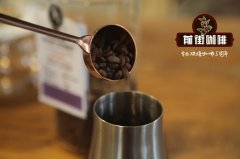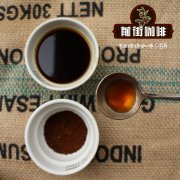How is the quality of Yunnan Zhukula small coffee beans? how can Zhukula small coffee beans taste good?

Professional coffee knowledge exchange more coffee bean information please follow the coffee workshop (Wechat official account cafe_style)
Two years ago, I accidentally went to Zhukula village and came back with no time to tidy up. Yesterday, I was tasting the coffee my colleagues had brought from northern Europe. I suddenly remembered these photos and looked back. I can still smell the pure native coffee in the mountain, and the coffee grounds at the bottom of that cup, so original, so pure.
Zhu Kula, located in the depths of the mountains in the northeast of Pingchuan Town, Binchuan County, Yunnan Province, is the junction of Chuxiong, Dali and Lijiang, surrounded by the Yupao River, a tributary of the Jinsha River. Due to inconvenient transportation, Zhu Kula is almost isolated from the rest of the world, so it is a little-known Yi shanzhai.
I remember that the road is quite steep, and only local masters who are familiar with the road conditions can have safety and security.
The ancient coffee forest in Zhukula Village is a unique variety of Yunnan small-grain coffee in Yunnan, which is very rare and of excellent quality. It can be called the "living fossil" of Chinese coffee.
On July 29, 1896, French Catholic Father Tian Deneng planted the first coffee seedling under the back wall of the Catholic church in the village of Zhu Kula. Now there are 1134 old coffee trees and 24 old coffee trees.
Up to now, Zhukula Coffee has completely preserved the custom of primary processing and drinking of coffee beans, and it is one of the places of inheritance of Chinese coffee culture for a century. In Zhukula village, drinking coffee has become a local drinking custom, just as we drink tea.
The traditional folk processing of Zhukula coffee beans mainly includes sun drying, pestle and mortar peeling, iron pot stir-frying, stone milling and making coffee in soil cans, etc. Every family in Zhukula village has coffee. When the coffee is ripe, the villagers pick the coffee fruit, dry it and peel it off; roast the coffee beans with chicken oil or lard in a large iron pot for cooking; then grind them into coffee powder with ground stone, then wrap it in a piece of coarse white gauze and wrap it with a few tablespoons of coffee powder. Then fill the teapot with fresh water, boil it on a tripod in the fire pond, throw in the gauze ball wrapped in coffee powder, stir constantly with a small spoon, and after a while, take out the gauze ball, and the coffee is made.
A few years ago, the villagers of Zhukula village picked and processed fresh coffee beans at a purchase price of only 5 yuan per kilogram. This year, the purchase price has risen to 10 yuan per kilogram. The purchase price of coffee powder processed by the villagers is 120 yuan / kg.
END
Important Notice :
前街咖啡 FrontStreet Coffee has moved to new addredd:
FrontStreet Coffee Address: 315,Donghua East Road,GuangZhou
Tel:020 38364473
- Prev

Is Yunnan Xiaogi Baoshan with orchard berry Lan fragrant coffee good? what is the taste of Zuoyuan raspberry Lan Xiang coffee?
Professional coffee knowledge exchange more coffee bean information please follow the coffee workshop (Wechat official account cafe_style) Yunnan coffee quality has been growing in recent years, the Olympic roaster as a boutique coffee brand in China, coupled with the founder's roasting title, also let us have been working hard for Yunnan coffee, this berry Lanxiang is one of the results of our efforts! December 2015
- Next

Introduction to the cultivation of coffee in the old foundation manor of Lujiang dam in Yunnan. Where is the small grain coffee in Yunnan?
Professional coffee knowledge exchange more coffee bean information please follow the coffee workshop (Wechat official account cafe_style) Yunnan has always been the leader in domestic coffee cultivation, the overall quality of its coffee is better than Brazilian coffee, similar to Colombian small grain coffee. Liang Houfu, a famous news critic in the United States, wrote that the best origin of coffee in the world is in Yunnan, and the coffee produced in Yunnan is very enjoyable when it touches the tongue.
Related
- Detailed explanation of Jadeite planting Land in Panamanian Jadeite Manor introduction to the grading system of Jadeite competitive bidding, Red bid, Green bid and Rose Summer
- Story of Coffee planting in Brenka region of Costa Rica Stonehenge Manor anaerobic heavy honey treatment of flavor mouth
- What's on the barrel of Blue Mountain Coffee beans?
- Can American coffee also pull flowers? How to use hot American style to pull out a good-looking pattern?
- Can you make a cold extract with coffee beans? What is the right proportion for cold-extracted coffee formula?
- Indonesian PWN Gold Mandrine Coffee Origin Features Flavor How to Chong? Mandolin coffee is American.
- A brief introduction to the flavor characteristics of Brazilian yellow bourbon coffee beans
- What is the effect of different water quality on the flavor of cold-extracted coffee? What kind of water is best for brewing coffee?
- Why do you think of Rose Summer whenever you mention Panamanian coffee?
- Introduction to the characteristics of authentic blue mountain coffee bean producing areas? What is the CIB Coffee Authority in Jamaica?

